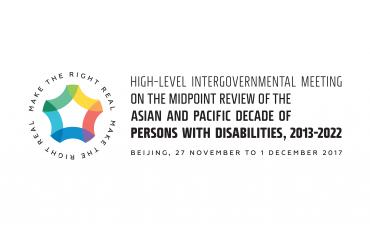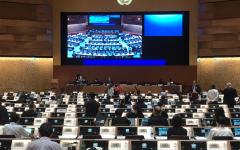IDA participated in the High-level Intergovernmental Meeting on the Midpoint Review of the Asian and Pacific Decade of Persons with Disabilities, 2013-2022, that took place in Beijing from 27 November to 1 December 2017. Organized by ESCAP in cooperation with the China Disabled Persons’ Federation (CDPF), the meeting reviewed the progress made in the implementation of the Incheon Strategy to “Make the Right Real” for Persons with Disabilities in Asia and the Pacific, informed by baseline data on its 41 core indicators.
Welcoming Senior government officials, policymakers, civil society and academia from over 30 countries across Asia-Pacific, Chinese President Mr. Xi Jinping’s said in an opening message to the meeting, “The Asian and Pacific Decade of Persons with Disabilities was initiated by China in Beijing. It has greatly propelled Asia-Pacific countries and regions to learn from each other, and set an example of cooperation to benefit persons with disabilities.” Adding, “I hope the meeting will make new contributions to the well-being of persons with disabilities in this region.”
The meeting introduced the report by ESCAP entitled, ‘Building Disability‑Inclusive Societies in Asia and the Pacific’, which show that persons with disabilities continue to face extreme poverty and are up to six times more likely to be unemployed. Their participation in decision-making is also low, with only 0.4 per cent representation in national parliaments across the region.
A major concern highlighted in the study was that women and girls continue to experience additional barriers to participation across many sectors of society, and the inclusion of disability perspectives in disaster risk reduction falls short, with only eight countries having relevant strategies. The availability of disability data also remains a challenge across Asia-Pacific.
At the conclusion of the five-day meeting, the ‘Beijing Declaration,’ was adopted which reaffirmed governments’ commitment to expedite implementation of the Incheon Strategy, as well as other global agreements such as the 2030 Agenda and the CRPD.
IDA was represented by its Inclusive Development Liaison, along with IDA members in the region including Mr. Setareki S. Macanawai, of the Pacific Disability Forum and David Corner of Inclusion International.
The opening panel discussion on the “Interlinkages of the Incheon Strategy to ‘Make the Right Real’ for Persons with Disabilities in Asia and the Pacific, the 2030 Agenda for Sustainable Development, and the Convention on the Rights of Persons with Disabilities”, included panelists such as Mr. Monthian Buntan, Member of the National Legislative Assembly, Royal Thai Parliament and Member of the United Nations Committee on the Rights of Persons with Disabilities, Mr. Mohd Fazari Mohd Salleh, Deputy Director of Malaysia’s Department of Social Welfare, Ministry of Women, Family and Community Development, Mr. Kim Eunsub, Director General Social Development Department Korean International Cooperation Agency, Mr. Setareki S. Macanawai, Chief Executive Officer, Pacific Disability Forum and a representative of the International Disability Alliance Secretariat.
Mr Setaraki Macanawai highlighted how civil society has a key role in supporting national, regional and international sustainable development implementation, through the Incheon Strategy and the 2030 Agenda, and that the shrinking space for civil society participation is a deeply concerning trend at all levels. IDA additionally commented on the potential for the Incheon Strategy to act as a guide for global disability-inclusive development efforts in line with the SDGs and CRPD, particularly within the regions experience in multistakeholder engagement, disability inclusive development indicators and data collection. Looking towards the next five years of the Asian and Pacific Decade of Persons with Disabilities, IDA highlighted that persons with disabilities have platforms to increasingly engage within sustainable development processes at the global and regional levels through the Stakeholder Group of Persons with Disabilities (read more here) and through the Disability Constituency within the Asia Pacific Regional CSO Engagement Mechanism. Adding that these platforms for civil society engagement must be continually utilized to ensure that the ambitions of the Asian and Pacific Decade of Persons with Disabilities and the 2030 Agenda are achieved.
IDA representatives further spoke within Side Event panels, including “Employing a multi-stakeholder approach to promoting disability rights” hosted by the Korean Disability Forum (KDF). IDA highlighted the how DPOs have a place at the table within all sustainable development processes through multi-stakeholder platforms and gave examples of the ways that DPOs are engaging other civil society and governmental sectors at the national level to promote the inclusion of persons with disabilities in development.
Bilateral Meetings:
IDA representatives met with former Ambassador Joon Oh from the Republic of Korea a representative of Korean Women with Disabilities Art & Culture Network to discuss the increased engagement of DPOs from Northern Asia, including the Republic of Korea, China, Japan and Mongolia, within regional sustainable development processes and regional disability networks.
IDA representatives additionally met with the Korean Network of Women with Disabilities to discuss strengthening regional women with disabilities networks and collaboration. The meeting discussed how Korean women with disabilities can further engage and increase leadership within sustainable development activities and processes.
To see interviews from the Midpoint review please find the link here: Voices of the Midpoint Review: https://www.youtube.com/user/unescap/videos


